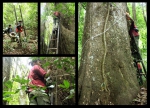ITB Studium Generale: Realizing Sustainable Civilization in Ecological Perspective
By Adi Permana
Editor Adi Permana
BANDUNG, itb.ac.id – Another general lecture from KU4078 Studium Generale was held live at ITB West Hall. The lecture was titled "Reshaping Development: How Engineers and Scientists Encourage Revolution towards a Sustainable Future".
This general lecture was presented by David Sutasurya on Wednesday (15/3/2023). David himself currently serves as Executive Director of Yaksa Pelestari Bumi Berkelanjutan (YPBB) and is active in Indonesia Zero Waste Alliance. He is also a part of the team of experts that compose various policies and strategies regarding environment and sustainable development.
In the lecture, David talks about the issue of climate change which is causing ecological crises all over the globe. The climate change phenomenon which began with global warming is a critical issue that we are currently facing. The massive impact of climate change which will end with environmental catastrophes has brought us new ideas and concepts that are more sustainable in an effort to protect the environment and the next generations.
"Our challenge is to decrease our burden to this planet and at the same time restore Earth's carrying capacity to its original condition so that in the end we can achieve sustainability. And that is the legacy that we must leave to ourselves and our children," he said.
Furthermore, David explained that humans and nature are two entities that are interconnected and interdependent. However, modernization has created an illusion that deludes our perspective that human life is not directly connected with nature.
Ecological crisis in a form of environmental destruction happens gradually and cumulatively like a snowball. On the surface, we may think that ecological damage caused by human activities is not that poignant, but in a long time its impact will grow exponentially and after certain points, there will be no turning back.
On the other hand, humans are often faced with complex moral dilemmas between prioritizing fulfilling their needs and ensuring ecological sustainability. Almost all actions that we took to fulfill our livelihood have impacted the crumbling of ecological values. He quoted data that shows that 62% of greenhouse gas emissions originated from economic chains, from natural resources extraction, production, and consumption, to disposal.

This issue according to David appeared because the economic system that we generally use is linear. This causes natural resources to deplete while the environment continues to crumble due to produced waste. "Production growth is linear with environmental destruction, because the more we produce, the more we exploit, the more we destroy the environment," expressed David.
In facing this astronomical scale of ecological change, humans are demanded to create new innovations through a revolution in our way of thinking. Moreover, David said that structural shifts in our developmental goals need to be oriented on improving the people's welfare instead of just based on quantity and productivity.
"Our role as academicians is to achieve eco-efficiency, which is reaching the optimum level of welfare with the minimum level of environmental destruction. That is what needs to be the success indicator of innovation in the future," concluded David.
Reporter: Hanifa Juliana (District and City Planning, 2020)
Translator: Favian Aldilla R (Civil Engineering, 2019)

.jpg)
.jpg)
.jpg)
.jpg)
.jpg)


